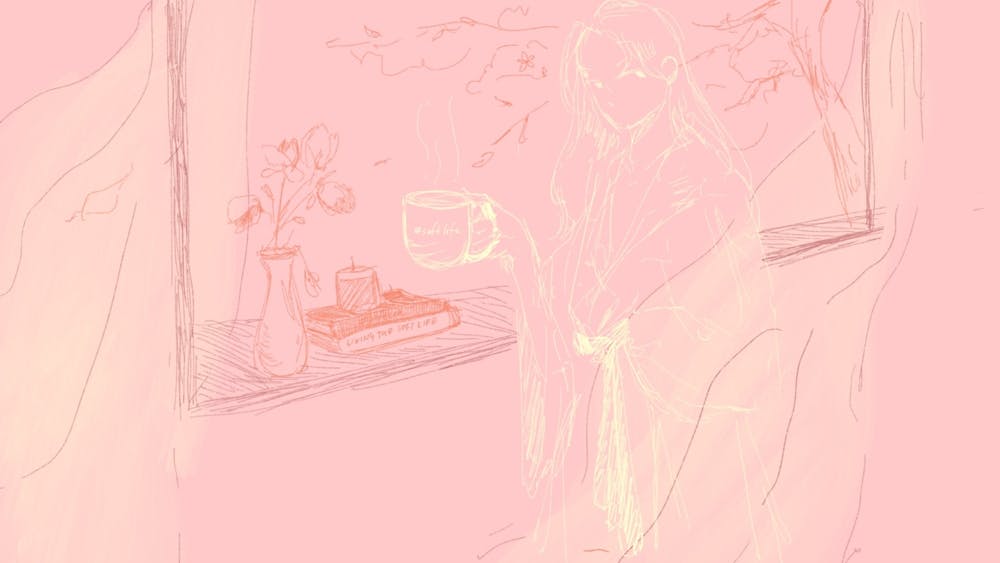Luxurious skincare routines, silk pajamas, mindfulness journals, and endless self–care. These are some of the hallmarks of the “soft life,” a new lifestyle aesthetic that has been taking off on TikTok in recent weeks. Similar to the simple, yet carefully stylized “clean girl” aesthetic, the soft life emphasizes taking care of oneself and minimizing stress from work or academic pursuits. It’s another trend in a long line of people trying to idealize their lives.
The aesthetic originated among Nigerian female influencers, and has recently expanded to other demographics. The idea of a soft life has particularly resonated with Black women because of its femininity and emphasis on mindfulness, self–care and self–love. BET writer Tira Urquhart argues that because Black women have been expected to be strong, independent, and settle for “struggle love." It could therefore be said that living the soft life allows Black women to break free from society’s expectations.
For some young folks, the soft life is a genuine rebellion against the do–it–all mentality—an active step to protect one’s peace and establish a work–life balance. However, this lifestyle trend has also been criticized as a return to traditional gender roles for women, given that some people advocate acquiring a soft life through financial dependence on a man.
Under the #softlife tag on TikTok, for example, one video by user @benitajadah states, “I’m so sick and tired of girls these days not letting their man tell them what to do. … Let him feel like a man around you. There’s nothing wrong with listening and submitting to the right man.” Other videos glamorize being a stay–at–home girlfriend or mom, arguing that women who criticize their lifestyle are simply jealous or insecure.
In early October, a TikTok went viral on Twitter, in which micro–influencer @merlene.d shows herself eating at a restaurant, with the following caption: “pov: you spot your target who's going to pay your bill but a waiter is having a long ass conversation with him.” The post prompted a wave of criticism, with commenters calling it “gentrified panhandling.” Merlene responded to her critics with a tutorial that shows other women how to get men to pay for these solo dates. “Manifesting is key,” she captained her TikTok.
Like all lifestyle aesthetics, the soft life is deeply materialistic. It doesn’t equate to living a simple life; it’s more about living a life of quiet luxury. The soft life—characterized by indulgent travel, luxury purchases, and ample time devoted to oneself outside of work—is only accessible once you’ve reached a high socioeconomic status. Hustle culture is toxic, but unless you’re born into a privileged status, the hustle likely comes before the soft life.
For some women, relying on a man to finance their soft life may seem like the solution. It’s no coincidence that while videos promoting this lifestyle are skyrocketing in popularity, while people fiercely debate the term “stay–at–home girlfriend.” While there is nothing wrong with being a stay–at–home partner, should social media really be encouraging women to forego financial independence to match a TikTok aesthetic?
Lifestyle influencers frequently conflate a mindset change with consumerism, making viewers feel like they need to spend money in order to keep up. When Black female creators started the soft life trend, the aesthetic was about prioritizing self over work at its core. While completely committing to that mentality can be considered a privilege, taking small steps toward self–care is possible without spending money on luxury clothes and expensive meals.
Most importantly, individuals can exercise self–care without overly relying on a partner. A key aspect of feminist progress has been giving women the power of choice—whether that choice is to stay at home or to go into the workforce is a woman’s own decision. Nevertheless, over–idealizing a soft, stay–at–home lifestyle overlooks the necessity of having your own financial resources to achieve this goal.
Your idea of a “soft life” doesn’t have to be the same as the one seen on social media. Lifestyle trends should be seen as aspirational, not necessarily realistic for every individual, especially when they promote a rosy view of adulthood.

